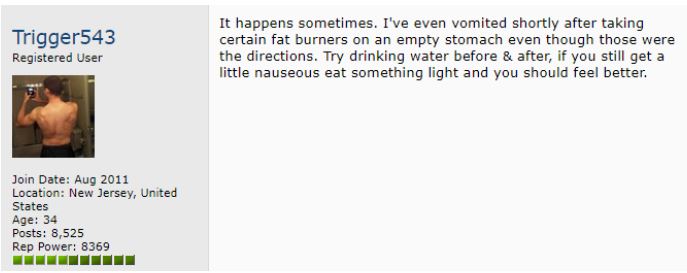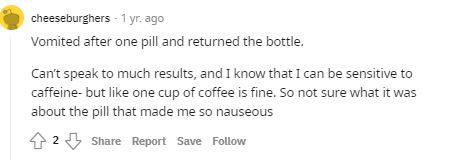Does PhenQ Make You Nauseous? (How To Stop It?)
Max Health Living is a reader-supported site. Purchases made through links may earn a commission. Learn more.
On average, about 20-30% of patients complain of nausea after trying a new drug. The rate is even higher with stimulatory drugs, including various popular diet pills and fat burners. Some similar effects are also reported by PhenQ users.
Key Points:
- You may feel nauseous by taking PhenQ because its strong ingredients irritate gastrointestinal walls when your gut is not accustomed to them.
- Nausea and other gut disturbances are usually relieved within a week or two of starting PhenQ supplementation.
- Find more about PhenQ on its official website.
Therefore I have researched PhenQ ingredients for their ability to cause nausea, and the results are presented below in the article.
However, generally, you become nauseous when your stomach produces more acid, which flows back toward your mouth, making you uncomfortable. And, PhenQ ingredients also have this potential and can leave you feeling queasy after taking the pill.
Keep reading to find out how you can avoid and stop nausea caused by PhenQ;
Why Do Diet Pills Make Me Nauseous?
Nausea and gut unrest are the most common complaints after starting a diet pill. Sometimes these symptoms fade away within a few days, but sometimes the issue prevails, forcing you to stop the supplementation.
Discussions on fitness forums like bodybuilding.com show that people felt nauseous after taking a weight loss supplement even if they followed the dosage guidelines.

Looking into the science of diet pills’ ingredients, I realized that many effective weight loss agents could be blamed for this discomfort. If you are feeling queasy after taking a weight loss supplement, one of the following ingredients may be the culprit behind it;
1. Caffeine Anhydrous
Caffeine anhydrous is added to weight loss supplements as it is an effective fat burner and energy booster. Hence, it helps you burn more calories and also gives you an energy boost, reducing the exhaustive feelings you experience when dieting.
But this stimulatory alkaloid also irritates the gut lining, triggering gastrointestinal secretions. And taking a higher dose would likely make you nauseous. That is why it is suggested by nutrition experts to monitor your caffeine intake carefully when using supplements. Or alternatively, you can switch to a stimulant-free alternative like PhenQ PM.
Check out our detailed review of PhenQ PM here.
2. Yohimbine
Yohimbine is an indole alkaloid compound used for weight loss, erectile dysfunction therapies, and diabetic neuropathies.
Its stimulatory nature makes it a potent irritant for the gut lining; thus, nausea, stomach acidity, and vomiting are common side effects seen in yohimbine users.
And when used without caution, this sympatholytics stimulant ad can damage health severely, so it is only allowed as a prescription drug.
3. Garcinia Cambogia
Garcinia is a herb often used in weight loss supplements as it reduces appetite and the formation of fat deposits in the body.
But many questions were raised on its safety when some cases of severe ailments like liver toxicity were reported.
Later on, research suggested that Garcinia is safe and well tolerated by most people when used in moderate doses over a short period. Mild side effects like abdominal pain, nausea, and vomiting may occur upon starting supplementation.
However, you should avoid using it for longer and consult your doctor before trying a Garcinia pill, as it can affect liver functions in the long run and may lead to toxicity.
4. Niacin
Niacin, or vitamin B3, is often added to fitness supplements for its ability to trigger metabolism. However, taking a higher amount may lead to severe gut issues like nausea, vomiting, diarrhea, etc.
A 2022 study on lab animals shows that niacin supplementation can induce nausea. Here, a worth-noting fact is that these animals were initially niacin-deficient, but eating a niacin diet made them nauseous.
Hence, the ingredients that make diet pills effective are the reason for nausea as well.
But every drug has a different recipe, so let’s see what PhenQ has got that may induce nausea after using it;
Why Does PhenQ Makes You Nauseous?
PhenQ is a safer drug than most other diet pills as it does not contain any stimulant associated with severe health complications, as I discussed above for yohimbine and Garcinia.
Its ingredients that may induce nausea are caffeine, niacin, and nopal extracts. But their concentration is not as high as to cause a long-term health issue. Hence, PhenQ nausea is short-lived and usually lasts for about a week.
Besides that, timing and method of taking the supplement are also important because the wrong dosage immediately disturbs the gut, triggering acid reflux and stomach ache.
Following are the reason why PhenQ makes you nauseous;
1. It’s Your Initial Week On PhenQ
Mostly the complaint of nausea from PhenQ comes from people who just started with it. Hence, their gut is not yet used to handling its strong thermogenic ingredients.
To understand how this happens, you need to take a sneak peek into gut physiology;
When a new or highly potent ingredient enters your stomach, defensive mechanisms are turned on. Your gut takes the new substance as a harmful agent and secretes copious amounts of acid to destroy it.
When these acidic secretions reach a certain level, acid flows back into the food canal. Resultantly, you feel heartburn and nausea.
If you are not used to stimulants, even the common ones like caffeine or the ingested substance is highly potent; your body will force you to vomit it out. Other times you will just feel queasy for a while.
As PhenQ is low on stimulants, users rarely report vomiting after taking these pills.
2. You Drink Too Much Coffee With PhenQ
Caffeine is one of the main ingredients of both coffee and PhenQ. The safe upper limit, according to FDA, is 400 mg and taking more caffeine than that can lead to severe consequences.
However, you may experience nausea even if your caffeine intake is below this threshold. That’s because gastric secretions are stimulated when you take more caffeine than your normal routine, no matter how far you are from the safe limit.
As each PhenQ tablet has 142.5 mg of caffeine, which is more than two cups of regular coffee. Hence, its caffeine content is moderate and can be easily managed within the safe limit.
However, if you do not adjust your coffee intake and consume more caffeine than normal, you will feel nauseous and uneasy.
3. You Take PhenQ On An Empty Stomach
You become more prone to nausea if you take diet pills on an empty stomach. That’s because stomach acidity is at its peak in the morning before you eat something. Taking substances that further irritate the gut walls will overflow your stomach with acidic juices.
In PhenQ, ingredients like caffeine, Nopal, and chromium irritation may lead to acid reflux if you do not consume food with PhenQ.
4. You Are Allergic To PhenQ Ingredients
Nausea and abdominal discomfort after ingesting something are the preliminary symptoms of a food allergy.
Hence, you may become nauseous after taking PhenQ because you are sensitive to one or more components of the weight loss pill. Caffeine intolerance is the most common example, but many people are also sensitive to nopal extracts or niacin.
Every person has a different allergen tolerance, and the intensity of side effects varies accordingly. For example, some people, like cheeseburghers, are more sensitive to caffeine and end up vomiting after taking a PhenQ pill.
 Others, like Radicalife, only experience mild GI issues, and their condition is back to normal within a week.
Others, like Radicalife, only experience mild GI issues, and their condition is back to normal within a week.

How To Stop Nausea Caused By PhenQ?
1. Start With One Pill A Day
Starting small is an effective way to prevent the initial gut unrest from a drug. This way, your body starts recognizing the new ingredients, and defensive responses are less frequently triggered.
The company recommends taking 2 pills daily, but you may start with 1 pill for the first week because taking half the recommended dosage can help you avoid nausea.
2. Take PhenQ Only With Breakfast And Lunch
The brand recommends taking pills with breakfast and lunch because taking them on an empty stomach can cause nausea.
However, if you take it with food, the acid mixes up with the meal and is utilized in digestion instead of flowing back into the esophagus.
3. Reduce Caffeine Intake
When taking a caffeinated supplement, it’s important that you do some aftermath to figure out how much caffeine you consume daily.
Major food sources of caffeine are coffee, energy drinks, sodas, chocolates, and cocoa desserts.
If you want to know how much coffee you can still drink with PhenQ, read my detailed post about it here.
4. Drink More Water
User feedback shows that staying hydrated can help avoid and reduce diet pill nausea.

That’s probably because water facilitates the absorption of most compounds. When the ingredients are absorbed and mixed in blood, they will find less time to interact directly with the gastric glands.
Important Disclaimer: The information contained on MAX HEALTH LIVING is intended for informational and educational purposes only. Any statements made on this website have not been evaluated by the FDA and any information or products discussed are not intended to diagnose, cure, treat, or prevent any disease or illness. Please consult a healthcare practitioner before making changes to your diet or taking supplements that may interfere with medications.
Who We Are

We are a team of fitness, health, and supplement experts, and content creators. Over the past 4 years, we have spent over 123,000 hours researching food supplements, meal shakes, weight loss, and healthy living. Our aim is to educate people about their effects, benefits, and how to achieve a maximum healthy lifestyle. Read more.




